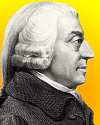 (source)
(source)
|
Adam Smith
(baptised 16 Jun 1723 - 17 Jul 1790)
Scottish philosopher who presented a foundation of classical economics in his influential book, An Inquiry into the Nature and Causes of the Wealth of Nations (1776), in which he worked out theory of division of labor, money, prices, wages, and distribution.
|
Science Quotes by Adam Smith (6 quotes)
But poverty, though it does not prevent the generation, is extremely unfavourable to the rearing of children. The tender plant is produced, but in so cold a soil, and so severe a climate, soon withers and dies.
— Adam Smith
An Inquiry Into the Nature and Causes of the Wealth of Nations (1776). In The Works of Adam Smith (1812), Vol. 2, 120.
Every individual is continually exerting himself to find out the most advantageous employment for whatever capital he can command. It is his own advantage, indeed, and not that of society, which he has in view. But the study of his own advantage naturally, or rather necessarily, leads him to prefer that employment which is most advantageous to the society.
— Adam Smith
In 'Of Restraints upon Importation', An Inquiry Into the Nature and Causes of the Wealth of Nations (1776), Vol. 2, Book 4, 32
I have no great faith in political arithmetic.
— Adam Smith
In An inquiry into the nature and causes of the wealth of nations (1789), 310.
People of the same trade seldom meet together, even for merriment and diversion, but the conversation ends in a conspiracy against the public, or in some contrivance to raise prices. It is impossible indeed to prevent such meetings, by any law which either could be executed, or would be consistent with liberty and justice.
— Adam Smith
An Enquiry into the Nature and Causes of the Wealth of Nations (1776). In R. H. Campbell and A. S. Skinner (eds.), An Enquiry Into the Nature and Causes of the Wealth of Nations (1976), Vol. 1, Book 1, Chapter 10, Part 2, 145.
Science is the great antidote to the poison of enthusiasm and superstition.
— Adam Smith
An Inquiry into the Nature And Causes of the Wealth of Nations (1776, 1801), Vol. 2, 314.
Wonder … and not any expectation of advantage from its discoveries, is the first principle which prompts mankind to the study of Philosophy, of that science which pretends to lay open the concealed connections that unite the various appearances of nature.
— Adam Smith
In 'The History of Astronomy,' Essays on Philosophical Subjects (1795).
Quotes by others about Adam Smith (2)
Adam Smith says that nobody ever imagined a god of weight—and he might have added, of the multiplication table either. It may be that the relations of Nature are all as inevitable as that twice two are four.
From chapter 'Jottings from a Note-book', in Canadian Stories (1918), 178.
If logical training is to consist, not in repeating barbarous scholastic formulas or mechanically tacking together empty majors and minors, but in acquiring dexterity in the use of trustworthy methods of advancing from the known to the unknown, then mathematical investigation must ever remain one of its most indispensable instruments. Once inured to the habit of accurately imagining abstract relations, recognizing the true value of symbolic conceptions, and familiarized with a fixed standard of proof, the mind is equipped for the consideration of quite other objects than lines and angles. The twin treatises of Adam Smith on social science, wherein, by deducing all human phenomena first from the unchecked action of selfishness and then from the unchecked action of sympathy, he arrives at mutually-limiting conclusions of transcendent practical importance, furnish for all time a brilliant illustration of the value of mathematical methods and mathematical discipline.
In 'University Reform', Darwinism and Other Essays (1893), 297-298.
 In science it often happens that scientists say, 'You know that's a really good argument; my position is mistaken,' and then they would actually change their minds and you never hear that old view from them again. They really do it. It doesn't happen as often as it should, because scientists are human and change is sometimes painful. But it happens every day. I cannot recall the last time something like that happened in politics or religion.
(1987) --
In science it often happens that scientists say, 'You know that's a really good argument; my position is mistaken,' and then they would actually change their minds and you never hear that old view from them again. They really do it. It doesn't happen as often as it should, because scientists are human and change is sometimes painful. But it happens every day. I cannot recall the last time something like that happened in politics or religion.
(1987) -- 


